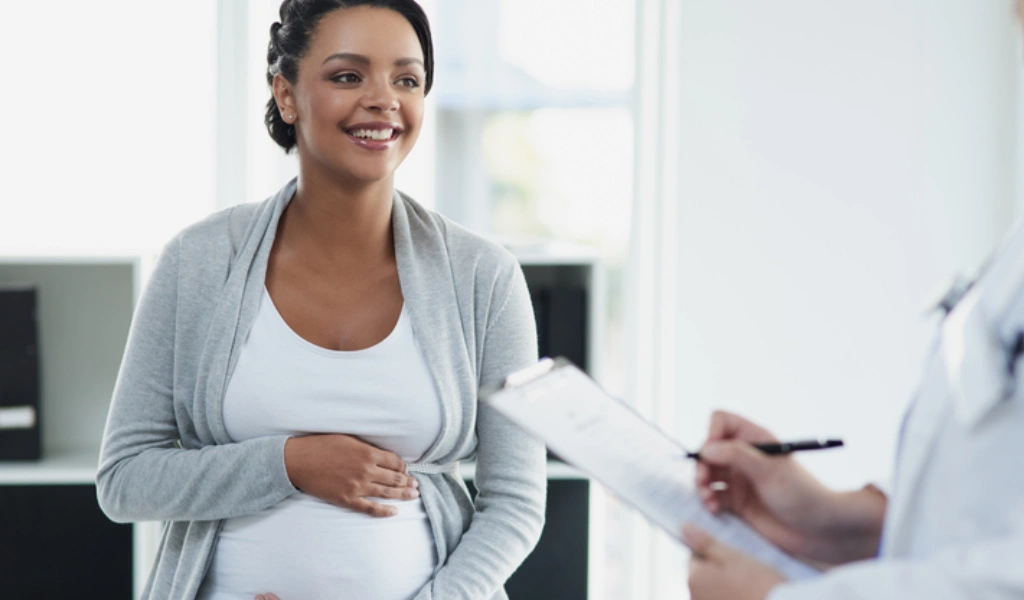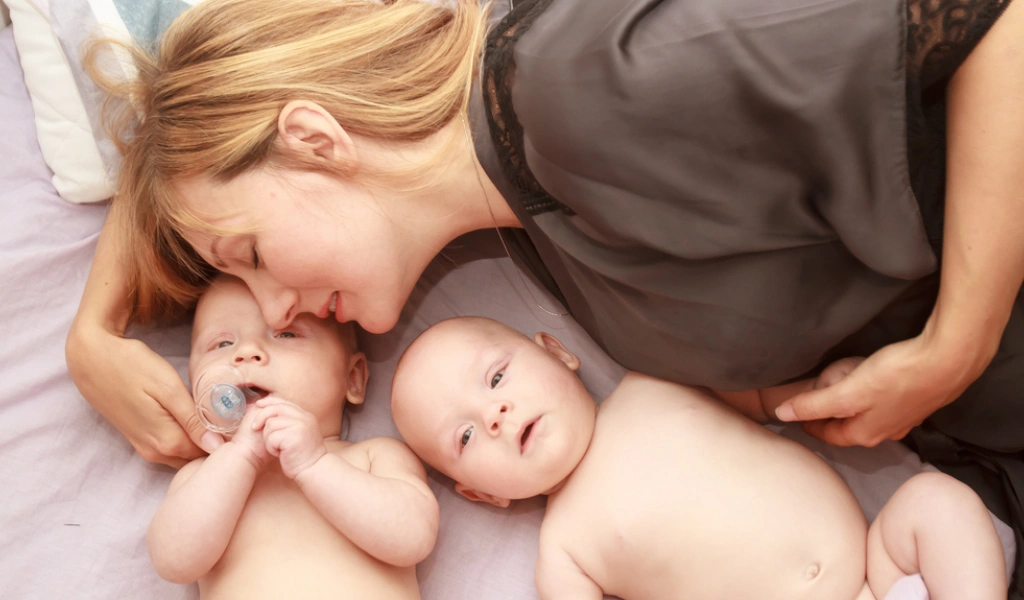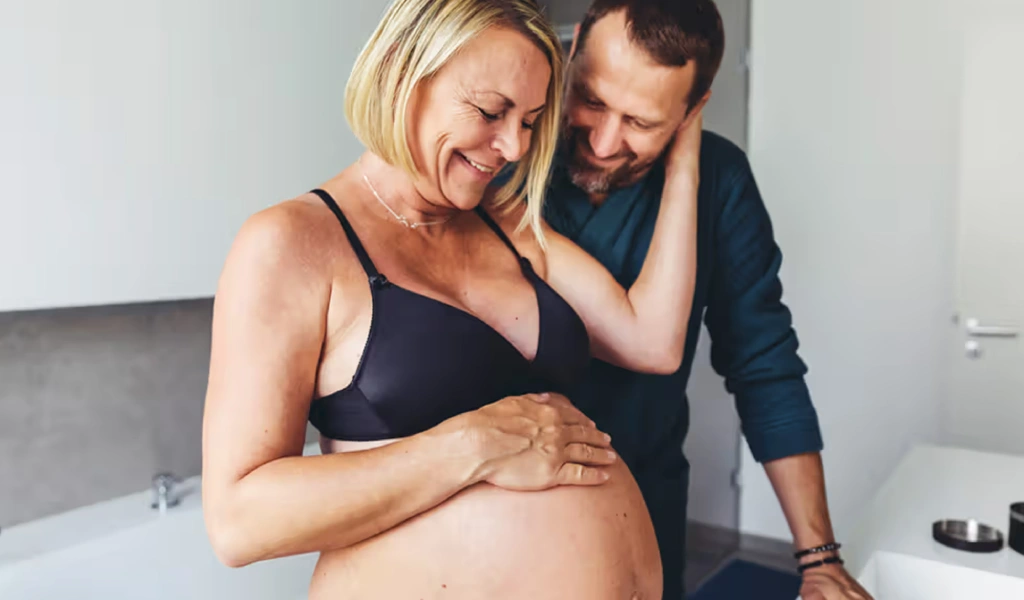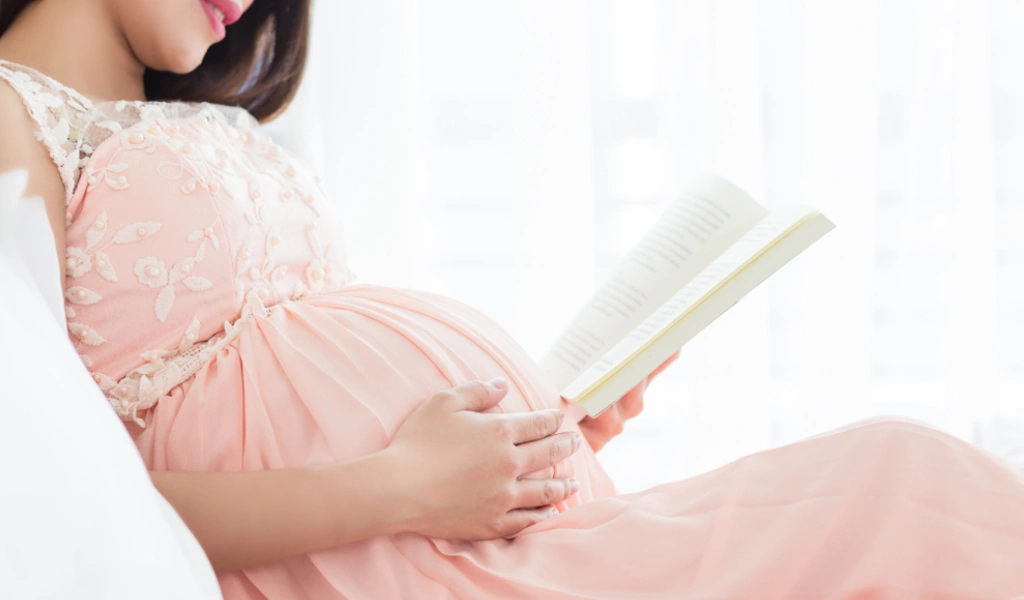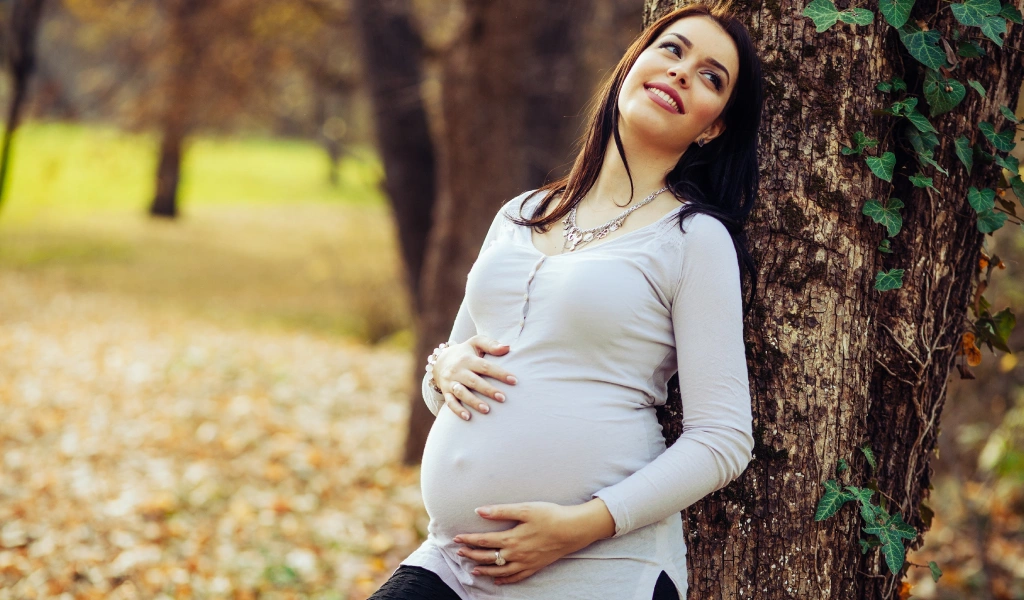It is important to carefully assess risks and seek advice from a knowledgeable individual before deciding to get pregnant after the age of 45. Experts have debated the implications of pregnancy at the age of 45 or later.
When Sumina (my friend) became pregnant at the age of 48, news of her advanced pregnancy quickly circulated throughout society. Many people talked about how advancements in science had enabled her and her husband, to get pregnant at a later age.

In the past few years, many women, not just celebrities, have been choosing to postpone pregnancy having children for personal or career-related reasons. Some studies suggest that pregnancies in older women may be more difficult to handle compared to younger women. Nevertheless, other experts believe that age should not be a hindrance to getting pregnant at the age of 45 or after.
To learn about the impact of advancing age on pregnancy and ways to maintain good health during pregnancy, read this article ‘Whether to Have Pregnancy at Age of 45 or After?’
Is it possible for a woman to get pregnant naturally at 45?
Yes, it is uncommon but feasible to get pregnant at the age of 45 without needing fertility interventions. While menopause may be nearing, as long as you have not gone without periods for 12 months, there is still a possibility of getting pregnant.1
Additionally, each woman’s health is unique, and menopause can occur earlier or later for different individuals. Although it is feasible to conceive after the age of 45, it is categorized as a pregnancy with higher risks. This is mainly due to the decline in fertility as women age, which leads to higher chances of experiencing complications like miscarriages, gestational diabetes, and premature birth.
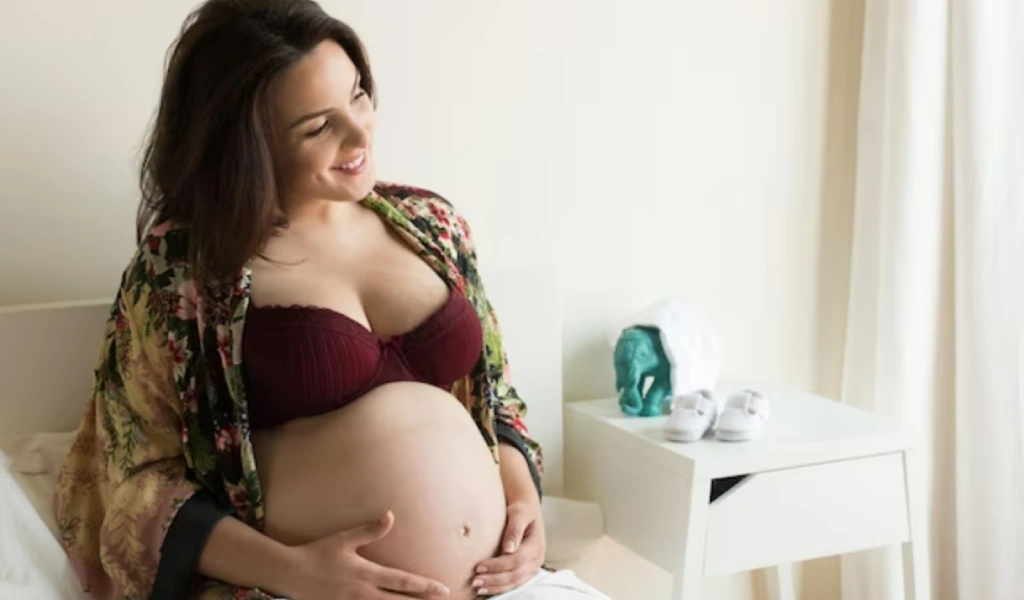
Additionally, there is an elevated likelihood of giving birth to a child with chromosomal abnormalities, such as Down syndrome. Your doctor will assess whether pregnancy is suitable for you and provide recommendations to ensure a healthy and safe pregnancy.
Based on preliminary data from the US CDC in 2021, approximately 2.3% of annual births in the US result from assisted reproductive technology (ART), a form of fertility treatment. This suggests that the rising trend of pregnancy among women over 45 is likely a result of fertility treatments.2
What is the likelihood of getting pregnant at the age of 45?
Age-related infertility is an important consideration when attempting to conceive at the age of 45 or older. Pregnancy at 45 or older is not comparable to conceiving in one’s 20s.
A woman in her 30s has a 20% likelihood of getting pregnant each month, but this drops to 5% for a woman in her 40s. By the age of 45, the probability of a successful pregnancy3 using one’s eggs decreases to 1%. However, through IVF with donor eggs, the chances rise significantly to 70-75%. However, these statistics are simply numbers, and behind them lie some truly remarkable stories.
Samunia, an author and mother, recounts her extraordinary journey of conceiving naturally at the age of 45. She shares, that I became pregnant naturally at 45 and a half years old, and gave birth to a healthy baby four months after my 46th birthday, our first and only child. This pregnancy happened after more than four years of undergoing in vitro fertilization (IVF) and other fertility procedures. Throughout those four years, I experienced two miscarriages. I received various diagnoses for my infertility, including high FSH, a luteal phase defect, a blood clotting disorder, low progesterone, and irregular ovulation. I explored alternative remedies such as acupuncture, herbal treatments, fertility-focused yoga, as well as various diets and dietary restrictions. On reaching the age of 45, my husband and I made the difficult decision to cease all medical interventions, as the chances of conceiving my eggs at or after 45 appeared bleak. Nonetheless, we continued to monitor my natural cycle and attempt to conceive without medical assistance. Miraculously, one month we succeeded in achieving pregnancy, and now our child is two years old and in excellent health.
Once you become pregnant, you will start to notice signs of pregnancy.
What are the indications and signs of being pregnant after age 45?
The symptoms experienced would be comparable to those faced by women during early pregnancy, but often they are misinterpreted as signs of menopause. The signs and symptoms may include urinating frequently, changes in mood, experiencing headaches, noticing differences in breasts, having trouble controlling urination, feeling tired, skipping periods, feeling nauseous, and having back pain. Women who are 45 years old and older are more likely to experience pregnancy complications.4
What are the potential dangers for the mother during pregnancy in advanced maternal age?
The dangers become significantly greater as you get older. If you become pregnant at the age of 45 or older, you are more likely to experience certain health issues5, such as:
- Gestational diabetes can develop during pregnancy.
- High blood pressure

- Placental issues occur when the placenta covers the cervix, a condition known as placental previa.
- C-section birth
- Inadequate uterine contractions for childbirth.
- If the embryo implants outside the uterus, it is called an ectopic pregnancy.
- The miscarriage rate is high, with half of pregnancies ending in miscarriage.
- The process of losing postpartum weight and getting fit can be difficult and taxing on the body.
A late pregnancy not only carries increased risk for the mother but also for the baby.
What are the possible risks a baby may encounter if their mother is 45 years or older when giving birth?
The likelihood of having a child with Down syndrome increases from one in 100 at age 40 to one in 10 at age 49. Furthermore, there is an increased chance of other chromosomal abnormalities, stillbirth, and premature labor6. Experts explain that as women get older, their eggs are more likely to have genetic errors, which can affect the outcome of a pregnancy. These errors are present 40% of the time in women aged 40-45 and nearly 99% of the time in women over 45.
Many older women who are trying to conceive may choose to use donated eggs, believing that using younger eggs reduces the risk. It is recommended to discuss genetic screening tests like amniocentesis with a healthcare provider before making a decision. Some strategies can be employed to ensure that a pregnancy later in life is a healthy one.
How can a woman ensure a healthy pregnancy at the age of 45?
To ensure a pregnancy that is safe and healthy, the following steps can be taken, regardless of your age:
- Ensure you receive appropriate prenatal healthcare.
- Make sure that maternal nutrition is adequate by following a balanced diet.
- Make sure to engage in physical activity consistently.

- Keep your weight at a healthy level.
- Engage in stress-relieving techniques.
- Refrain from consuming alcohol and tobacco.
After examining your complete health and family background, your healthcare provider will furnish you with further details. Following a review of your entire medical history, your physician will offer additional information to assist with your family planning.
What are the potential advantages of having a baby at a later stage in life?
While it is true that there are some benefits to becoming a parent later in life, they are not comparable to the advantages of having a child in one’s late 20s or early 30s. Nevertheless, there are certain positive aspects to consider:
- Having accrued additional life experiences, individuals gain a heightened understanding of the health risks and circumstances related to maternal health throughout pregnancy and childbirth.
- If this is your second child, you likely possess prior knowledge and skills in navigating the responsibilities and challenges of parenthood.
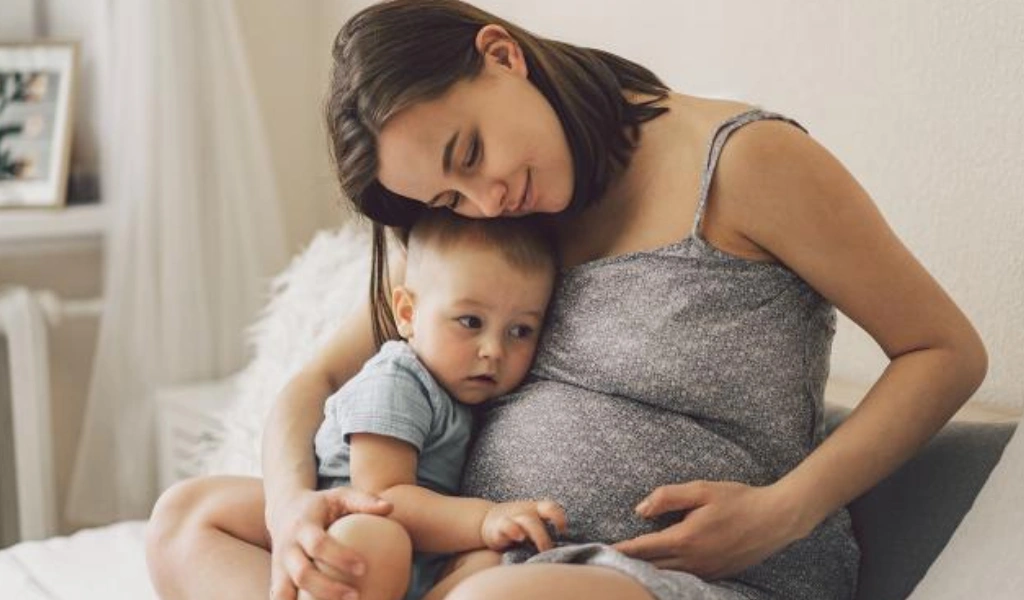
- Material possessions and relationship status are both to a specific extent.
- At times, individuals may choose to forgo parenthood but may later reconsider their decision. In such instances, it is pertinent to explore the feasibility of reversing this choice, particularly in the context of tubal ligation.
Is it possible to become pregnant after the age of 45 if you have undergone tubal ligation?
Tubal ligation is a method used for sterilization to avoid pregnancy. Although uncommon, there is a chance of tubal ligation reversal leading to pregnancy, with rates of one in 1,000 after one year and two in 10 to 1,000 after five years. It is important to note that the possibility of becoming pregnant still exists.
If you have been attempting to conceive and notice promising symptoms, it is advisable to consult with your healthcare provider as ectopic pregnancy may occur following the procedure.7
Pregnancy at the age of 45 or later can present various difficulties. It is important to closely observe and monitor the pregnancy from the start to the delivery at this age. The mother and the fetus may face higher chances of experiencing certain complications due to the older maternal age. Nevertheless, with proper planning, consistent fetal monitoring, and timely medical assistance, a successful pregnancy and birth of a healthy baby are possible after the age of 45.
Therefore, it is advisable to seek advice from a healthcare provider before attempting to conceive at this age to evaluate the advantages and disadvantages thoroughly. Take into account both the positive aspects and negative aspects before reaching a decision.
Key Pointers of ‘Whether to Have Pregnancy at Age of 45 or After?’
- Conceiving a child naturally after the age of 45 poses challenges due to the decline in fertility associated with advancing age.
- Women who become pregnant at age 45 may encounter issues such as preterm labor, gestational diabetes, and pre-eclampsia.
- Babies born to mothers aged 45 and older are at greater risk of genetic disorders like Down syndrome.
- Advancing maternal age is associated with an elevated likelihood of miscarriage, stillbirth, and other chromosomal abnormalities.
It is advisable for women in this age group to maintain a well-balanced diet, engage in regular exercise, and receive proper prenatal care while avoiding stress, smoking, and alcohol consumption to promote a healthy pregnancy.

